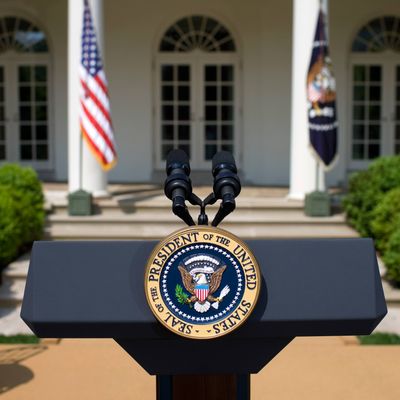
When a president you don’t like gets elected, it’s never a good feeling. Presidents, to make an obvious point, have a lot of power. So after the guy you don’t like gets elected (yep, still all guys), you spend a lot of time worrying about the future: What’s he going to do? How will his policies and personality affect America?
This time around, the worry trajectory feels different. The fear that is percolating in the period between Donald Trump’s win and his inauguration has a different shape. Part of what’s going on here has to do with the power of ambiguity to hijack our brains. Most presidents come into office with pretty clear-cut policy agendas, whether you like them or not. You can make a pretty clear list of a bunch of things they’re going to do, or try to do.
With Trump, we know a few things that are high on his list — repealing Obamacare and taking a more law-enforcement-heavy approach to immigration — that are bad enough, but there’s also this air of sinister mystery. That is, he made so many wild promises, many of them self-contradictory, that it’s just impossible to know what President Trump is really going to be like.
Does Trump really want us to forge a strong relationship with Russia (Vladimir Putin thinks so)? If we do, what will that mean for the NATO alliance? How serious was Trump about that ridiculous border wall? Is he really going to try to keep people from Muslim-majority countries out of America? Because of the sheer quantity and audacity of his campaign promises, and because so many of them will be difficult to pull off practically, we’re living in this weird purgatory-fog. At some point it’ll clear, at least for a moment, and we’ll get a glimpse of the new world we’re in, but until then there’s no way to know what that world will look like.
So it’s natural many of us feel like we’re being held captive at the moment. Ambiguity makes just about any bad situation worse — it totally cuts off our ability to anticipate adverse future events, and adds a heaping layer of anxiety to the world.
In addition to causing deeply unpleasant feeling, periods of emotionally charged uncertainty can exacerbate humans’ “need for cognitive closure,” or an impulse to dispel ambiguity. Sometimes, this can lead to bad or impulsive decision-making that serves to help regain a sense of control or certainty. Luckily, there are steps you can take to counteract this tendency. For example, here are a couple suggestions from Jamie Holmes, author of Nonsense: The Power of Not Knowing, plucked from my article about his book:
One is to simply be deliberate in your decision-making, not just writing down, say, pros and cons, but listing as many potential consequences of different decisions as possible. It’s also important to realize that your need for closure can vary depending on the circumstances at the time. “You can kind of have a rough self-check — what is my need for closure today, this week? Have I been under a lot of pressure? Is there a lot of uncertainty in my life?”
Finally, there are a couple of broader options for people who want to better handle ambiguity, although Holmes admits they’re a bit less practical. One is to simply read fiction: “Reading fiction has been shown to lower people’s need for closure. I think that’s partially because it’s safe, and you go into this other world, and it’s kind of broadening our categories because we’re thinking about how other people make decisions.” And the other is “positive multicultural experiences,” which appear to have the effect of lowering need for closure for similar reasons.
So, for many of us, the next few months — and maybe (sigh) years — aren’t just going to feel scary and uncertain, but might also feed some of our less adaptive impulses. It’s a good time to be as cautious and open-minded as possible. Don’t let the ambiguity get to you.




